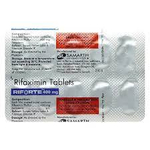curifix
Introduction to Curifix
Curifix is a medication primarily used to treat certain gastrointestinal conditions. It is known for its effectiveness in managing symptoms related to bacterial infections in the gut. Curifix is particularly beneficial for those suffering from traveler's diarrhea, irritable bowel syndrome with diarrhea (IBSD), and hepatic encephalopathy.
Composition of Curifix
Curifix contains the active ingredient Rifaximin, which is an antibiotic that works by inhibiting bacterial RNA synthesis. This action prevents the growth and replication of bacteria in the gut, making it effective for treating gut-specific infections.
Uses of Curifix
- Treatment of traveler's diarrhea caused by E. coli
- Management of irritable bowel syndrome with diarrhea (IBSD)
- Prevention of hepatic encephalopathy
- Off-label use for small intestinal bacterial overgrowth (SIBO)
- Off-label use for C. difficile-associated diarrhea
Side Effects of Curifix
Common Side Effects:
- Headache
- Nausea
- Abdominal pain
- Diarrhea
Serious Side Effects:
- Allergic reactions
- Liver dysfunction
- Clostridium difficile-associated diarrhea
Precautions of Curifix
Curifix should be used with caution in individuals with a history of liver disease. It is not recommended for those with hypersensitivity to Rifaximin or any component of the formulation. Pregnant or breastfeeding women should consult a healthcare provider before using Curifix. It is also not suitable for treating systemic infections.
How to Take Curifix
- For traveler's diarrhea: 200 mg three times a day for 3 days
- For IBSD: 550 mg three times a day for 14 days
- For hepatic encephalopathy: 550 mg twice a day for long-term use
- Curifix is taken orally, with or without food
Conclusion of Curifix
Curifix is a valuable medication for treating specific gastrointestinal conditions. Its ability to target gut-specific infections with minimal systemic absorption makes it a preferred choice for many patients. However, it is essential to use Curifix under the guidance of a healthcare provider to ensure safety and effectiveness.
Similar Medicines
Available in 2 variations

Curifix 400mg Tablet
Curifix 400mg Tablet
strip of 10 tablets

Curifix 200mg Tablet
Curifix 200mg Tablet
strip of 10 tablets
Related Faqs

What does Diracure do for the liver?
In liver disease, there is an increased growth of bacteria in the intestine which increases the load of toxins travelling through the body. This further increases the possibility of toxins reaching the brain which can cause abnormal brain function. Diracure slows down the growth of bacteria in the gut, decreasing the symptoms in cases of liver disease.

How long does Rizix take to work for IBS?
Rizix usually starts acting within 24 to 48 hours. The symptoms like diarrhea improve gradually after you start taking this medication. Usually, taking Rizix for 2 weeks relieves the symptoms of IBS. Moreover, it has also been seen that this 2-week course of Rizix provides relief for up to 10 weeks even after stopping the medication.

Can Curifix cure IBS?
Taking Curifix can help improve the symptoms and delay the recurrence of the disease. However, it is not sure whether it will cure the disease completely or not. It has been shown that Curifix can help improve the symptoms such as diarrhea, abdominal pain and discomfort. Consult your doctor for exact details on the treatment of IBS.
Related Posts

1:15
How to Increase Your Child’s Weight Naturally? Healthy Diet Tips for Parents!

1:15
Are Your Hormones Out Of Balance? Signs & Symptoms!

1:15
Amazing Benefits of Flaxseeds | Best Way to Eat Flax Seeds Daily!

1:15
Why Is There Blood in Your Poop? Causes, Symptoms, and When to See a Doctor!

1:15
How Do You Know If You Have a Vaginal Infection? Warning Signs!

















.svg)
